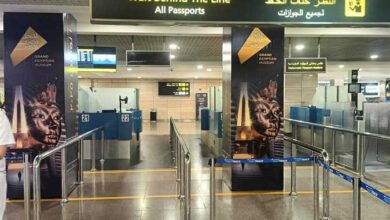Since 30 June 2013, a tide of adulation has been on the rise; it was not meant for the regime, not for the government, but rather for the president himself!
The regime has stumbled in several instances, the latest of which was the murdering of our soldiers in North. It was not the first attack, and we pray to God it is the last, but for that to become true, we are required, above anything else, to cease our increasingly flagrant spree of self-flattery.
Is hypocrisy that dangerous? If we stop it, does that help in countering terrorists?
On 17 November 1997, Luxor’s al-Deir al-Bahary became the scene of a heinous terrorist attack that killed 62 tourists and wounded 26 others. The assault represented a scandal for Egypt before the whole world. At that time, former president Hosni Mubarak was deeply embarrassed that he could not find some way to address the international community other than blame Britain for granting political asylum for some extremist figures.
Before and after that assault, several terrorist attacks also took place, reaching their climax in 2004, 2005 and 2010 in Cairo, Alexandria and the Sinai resorts of Taba and Sharm al-Sheikh.
But in 5 October 1985, an Egyptian police officer, Suleiman Khater, opened fire on a number of Israeli holidayers in Sinai, killing three adults and four kids. There was a consensus among the Egyptian elite and public opinion players that the attack was a heroic action. Khater’s lawyer, Salah Abu Ismail, the father of influential preacher Hazem Salah Abu Ismail, struggled for his client’s acquittal. But the Egyptian government, which was aware of the real story, referred Khater to a military trial. Egyptian media still remembers Khater as a popular hero, and Sharqiya governor recently commemorated the officer’s death.
We lie to ourselves when we say that Khater’s action was not terrorist, and we keep deceiving the president day and night when we blame our mistakes on others, just like Mubarak did with Britain over the Luxor massacre.
We are currently facing a series of terrorist operations that have been connectedly running from the seventies until present, and we can not counter them unless we abandon duplicity. Then, we are required to develop the function and role of security services for more than 100 years. It is unacceptable that the Interior Ministry remains in charge of fire fighting, car licensing, passport and ID issuance, and other services that are irrelevant to public security.
If suggestions to reform the security system are deemed by some as attempts to undermine those institutions, that’s untrue. Attention to reform at those services emanates from their vitality as the backbone of the state since the days of Mohamed Ali in the 19th century.
Developed states around the world have been eager to modernize the performance of their security services, ensuring the availability of advanced communication and information systems.
As terrorist operations occur in the same pattern at the same geographical area over the past three years, the official bodies, that are supposed to possess the information required to decipher that riddle, seem to lack them.
Marking a decisive end to the battle against terrorism is late, but how can we achieve it amid insufficient information? And how can information be available without developed, competitive institutions?
Edited translation from Al-Masry Al-Youm



